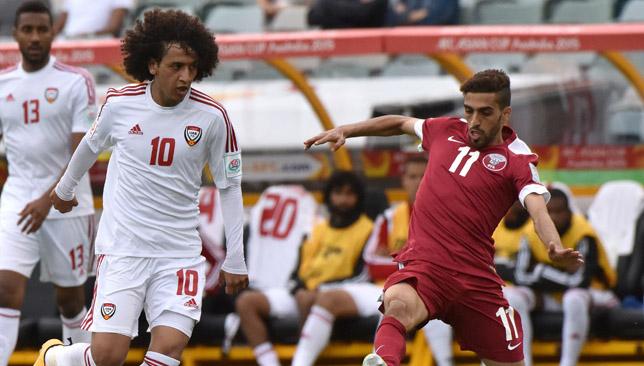
The Asian Cup group stage came to a close on Tuesday after an impressive 61 goals in 24 matches and a grand total of zero draws. The quarter-finals are set up neatly with some mouth-watering clashes such as Japan taking on the UAE, Iran playing Iraq, South Korea facing Uzbekistan and the hosts, Australia, taking on China, who had quietly come through with an impressive tournament. All the pre-tournament favourites figure in the final eight but nevertheless, the group stage gave audiences a few things to ponder as we move forward towards the tail-end of the Asian Cup.
– #Quiz360: WIN a six-month Target Gym membership
OMAR ABDULRAHMAN IS READY FOR A MOVE TO EUROPE
The hype that surrounds the Emirati maestro is justified. His performances on the pitch have been a class apart from almost any other Asian player and he is unquestionably among the top three most gifted players on show at the tournament. Against Bahrain and Qatar, he was directly involved in most of the Whites goals, while in the final group game against Team Melli, Omar was at the forefront of everything the UAE created. Unfortunately for him, the defensive bolt door of the Iranians was shut tightly.
What makes Omar special is that not only does he have great balance and vision but he does not go down easily. This attribute reminds a little of Leo Messi. While he gets barged quite often, he tries to stay on his feet, as illustrated by a mazy dribble through four Iranian defenders in the final group game, when he could have easily gone to ground for a penalty appeal.
Nevertheless, if Omar wants to be considered as Asia’s premier player and possibly elevate his global profile then the time is now to move to a higher standard of football in Europe. Now 23, he is young enough to adapt to European football. The only question marks will remain against his physical build, somewhat in the mould of Pablo Aimar, and his ability to move away from his comfort zone in the UAE.
ARAB SIDES HIGH IN NUMBERS, LOW IN QUALITY

Nine of the sixteen sides at the Asian Cup were Arab nations. By the quarter finals stage, only two of those have survived to progress and both were from groups that included other Arab countries. Iraq and the UAE are the sole survivors carrying the West-Asian flag and the odds will be stacked against them to bring back the trophy to the region.
During the 15 previous editions of the tournament, only three Arab countries have won the trophy – Kuwait, Saudi Arabia (twice) and Iraq, who most recently took home the 2007 edition. However, as East Asian football continues to make strides, West Asian football has arguably failed to keep up pace. There is also a shift in Arab football strongholds. Saudi Arabia dominated the scene from the mid-80s until the turn of the new century but the country is no longer the footballing force it once was. Qatar, despite their extremely disappointing showing, and the UAE are stepping up to the fore. The Emiratis have looked impressive but still lack the experience when it comes to facing traditional forces, as illustrated by a disappointing, though undeserved, defeat against Iran.

Overall, the Arab countries need to go back to the drawing board and come back stronger at the next tournament, which could well be staged in their region.
AUSTRALIA NEED REAL IMPROVEMENT
The Socceroos started the tournament as second favourites in their own back yard behind reigning Asian champions Japan. During their final group game, manager Ange Postecoglou made a few changes to freshen up his side against South Korea, but it ended up backfiring as the Australians suffered their first home defeat in more than 20 games through a solitary goal defeat.
That has placed Australia into a tougher side of the draw, where they could potentially face Japan if they overcome an impressive Chinese side. Analysts had attempted to quell Australian optimism before the tournament but it had not stopped the hype from getting to euphoric levels, especially after back to back high-scoring wins during their first two group games.
With Matthew Leckie, Tim Cahill and captain Mile Jedinak ready to step back into the starting line-up against China, Australia will be hoping that their first-choice side will produce a much better performance than during their previous outing. Nevertheless, if Australia is to win the trophy for the first time then they will have to do it the hard way.
SLEEPING GIANT CHINA ON VERGE OF AWAKENING
China has all the ingredients to be a football hotbed. The fact that they have failed to qualify for the World Cup regularly or win the Asian Cup yet somewhat beggars belief. The Chinese have qualified for 11 successive Asian Cup tournaments, since 1976. In fact, China hafe finished runners-up twice, third place twice and fourth place twice but the national side is not regarded as an Asian powerhouse.
The reason behind this could be that the expectations that follow Chinese football have yet to be met. But China are currently riding a wave of optimism having cleaned up corruption in their domestic game and seen Guangzhou Evergrande recently win the Asian Champions League. They are also overseeing the development of a good generation of footballers who may peak by the time the 2018 World Cup comes along.
Still, the national side surprised even the most optimistic of observers back home with an impressive nine-point haul during the group stages. In that process, they beat former Asian champions Saudi Arabia and came from behind to win against dark-horses Uzbekistan. With a match against hosts Australia in the quarter-finals, China will be full of confidence – though much will depend on captain Zheng Zhi being able to recover from injury in time.